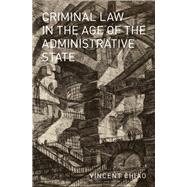Criminal Law in the Age of the Administrative State
, by Chiao, Vincent- ISBN: 9780190273941 | 0190273941
- Cover: Hardcover
- Copyright: 11/12/2018
What is the criminal law for? One influential answer is that the criminal law vindicates pre-political rights and condemns wrongdoing. On this account, the criminal law has an intrinsic subject matter-certain types of moral wrongdoing-and it provides a distinctive response to that wrongdoing, namely condemnatory punishment.
In Criminal Law in the Age of the Administrative State, Vincent Chiao offers an alternative, public law account. What the criminal law is for, Chiao suggests, is sustaining social cooperation with public institutions. Consequently, we only have reason to support the use of the criminal law insofar as its use is consistent with our reasons for valuing the social order established by those institutions. By starting with the political morality of public institutions rather than the interpersonal morality of private relationships, this account shows how the criminal law is continuous with the modern administrative and welfare state, and why it is answerable to the same political virtues.
Chiao sketches a democratic egalitarian account of those virtues, one that is loosely consequentialist, egalitarian but not equalizing, and centered on a form of freedom-effective access to central capabilities-as its currency of evaluation. From this point of view, the role of the criminal law is to help public institutions create a society in which each person can lead a life as a peer among peers. Chiao shows how a democratic egalitarian approach to criminal justice provides a fresh perspective on a range of contemporary problems, from mass incarceration to overcriminalization, due process and the collateral consequences of a criminal conviction.
In Criminal Law in the Age of the Administrative State, Vincent Chiao offers an alternative, public law account. What the criminal law is for, Chiao suggests, is sustaining social cooperation with public institutions. Consequently, we only have reason to support the use of the criminal law insofar as its use is consistent with our reasons for valuing the social order established by those institutions. By starting with the political morality of public institutions rather than the interpersonal morality of private relationships, this account shows how the criminal law is continuous with the modern administrative and welfare state, and why it is answerable to the same political virtues.
Chiao sketches a democratic egalitarian account of those virtues, one that is loosely consequentialist, egalitarian but not equalizing, and centered on a form of freedom-effective access to central capabilities-as its currency of evaluation. From this point of view, the role of the criminal law is to help public institutions create a society in which each person can lead a life as a peer among peers. Chiao shows how a democratic egalitarian approach to criminal justice provides a fresh perspective on a range of contemporary problems, from mass incarceration to overcriminalization, due process and the collateral consequences of a criminal conviction.






